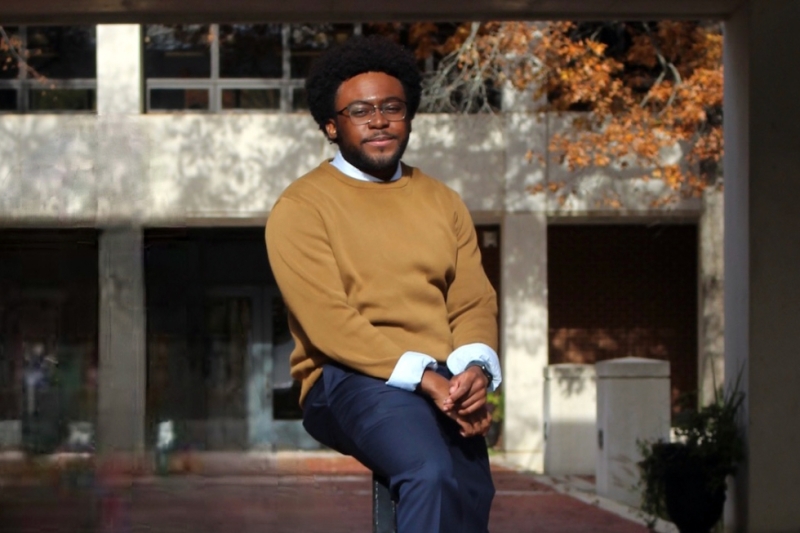Career Paths: Francis Morency ’23L After graduation, Francis Morency will join Shumaker, Loop & Kendrick LLP in the firm’s Tampa Office as an associate in the Bankruptcy practice group.
Francis Morency ‘23L is from North Miami, Florida. He received a B.A. in International Relations and African American Studies from Syracuse University. Between undergrad and law school, Francis taught 7th grade Civics and Law Studies in North Miami. Francis split his 1L summer between NextEra Energy’s Corporate Governance department and as a judicial intern for the Honorable Judge Peter D. Russin of the U.S. District Court for the Southern District of Florida, Bankruptcy court. He spent his 2L summer at Shumaker, Loop & Kendrick, LLP in Tampa, Florida. As a 3L, he serves as the Managing Editor of W&L’s Journal of Civil Rights and Social Justice, a Burks Scholar for Legal Writing, a Student Attorney for Small Business Start-Up Practicum, a Research Assistant for Professor Carliss Chatman, a judicial extern for the Honorable Judge Joel R. Branscom of the Botetourt Circuit Court, and a mock trial coach for BLSA.
Where will you be working after graduation, and in what practice area?
I will work at Shumaker, Loop & Kendrick LLP in the firm’s Tampa Office. I accepted an offer to practice with the Bankruptcy group after graduation.
Did you know coming into law school that, you wanted to work in this field?
Having volunteered with Catholic Charities Legal Services before law school, I knew that I enjoyed the thrill of litigation. However, 1L exposed me to transactional practice. I enjoyed the legal writing and research that comes with transactional law, but I could never shake off my interest in public speaking and the pressure of trying a case.
During 1L, the Black Law Students Association invited me to moderate a bankruptcy panel with Dean Mason. The judge and lawyers on the panel were candid about the lack of diversity in bankruptcy. But they explained bankruptcy law as an area with litigation and transactional elements. I was sold. After the panel, I shifted my summer internship search and applied to intern for Judge Russin in Bankruptcy court. At court, I witnessed lawyers, pro se parties, creditors, and debtors communicate their positions, focusing on the merits instead of the personal discourse that could come out when someone owes someone else money.
What role did the size and location of the firm play in the search and decision process?
I always knew I wanted to return to Florida after graduation. Living close to my family is important to me. Starting my legal career in a medium or small law firm was equally important. I wanted to join a firm that invested in sharpening my skills in the courtroom and provided room to actively participate in the community.
Was there anything in your law school or summer job experience that confirmed this career choice?
This summer at Shumaker confirmed my decision to pursue Bankruptcy law. Working in Shumaker’s Corporate, Business Litigation, Labor and Employment, and Bankruptcy practice groups gave me insight into the life of a business. Thankfully, the firm doesn’t pigeonhole. I’ll be able to work in various areas and get a strong sense of the moving pieces that involve businesses and the law.
Going to court in the Middle District of Florida mirrored my experience from the prior summer in the Southern District. The judges and attorneys were inspiringly knowledgeable about the Bankruptcy code. The debtors were often hardworking businesspeople who sought help during a tough time but never sought a wild bailout. Similarly, creditors were respectful and often wanted to work with debtors to find amicable solutions to debt owed.
What classes do you think are helpful to prepare for this job?
Legal Writing and Legal Research were the most important classes because they provided a blueprint on how to find and communicate important information. The skills I developed in those classes were the basis for my survival in my summer internships and in the Journal of Civil Rights and Social Justice.
The Uniform Commercial Code, Business Associations, Trial Advocacy, and Federal Jurisdiction were also important because they helped me explore my legal interests. Unfortunately, the Bankruptcy law class never aligned with my schedule, but I got amazing resources from judges and attorneys to get a good foundation in the area.
Can you describe the job search process?
I am a product of Covid-19 learning, which made the job search unusual. I am grateful for Dean Jarrett and Andrea Hilton because they spent time teaching me how to navigate the unprecedented landscape. I sent out a handful of applications to law firms that seemed like the best fit.
Online Campus Interviews were on Zoom. After interviewing with Shumaker, I knew that’s where I wanted to spend my summer. When I got a callback, I accepted the option for an in-person interview in Tampa.
What are you most looking forward to about this job?
I am looking forward to working with the exceptional minds that I worked with last summer. Although I will work long hours, I look forward to setting up roots in a new city and making memories with everyone at the firm.
 Frances Morency ’23L
Frances Morency ’23L
You must be logged in to post a comment.